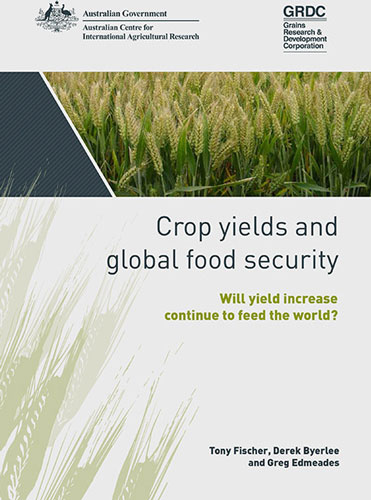By Tony Fischer (Honorary Research Fellow, CSIRO Plant Industry, Canberra, ACT, Australia), Derek Byerlee (Independent Researcher, Washington, DC, USA), Greg Edmeades (Independent Consultant, Cambridge, New Zealand) Monograph No. 158 (2014) of the Australian Centre for International Agricultural Research (ACIAR)
Co-authored by three former CIMMYT scientists and officially released at the recent Borlaug Summit on Wheat for Food Security, this book concludes that further, sustainable intensification of agriculture can produce enough food to meet the demand of a growing world population to 2050. Achieving this will require greater effort and investment in agricultural research, development and extension, especially in the developing world.
 Moreover, the increased-but-efficient (i.e., environmentally friendly) use of inputs will challenge scientists and farmers alike, particularly in high-potential, high-input environments. The authors focus on the major grains maize, rice, soybean and wheat, but touch briefly upon 20 or so other crops. They see special potential in Sub-Saharan Africa, where intensification has barely begun and there is large scope for closing the “yield gap” – the difference between farmers’ yields and those obtained on research stations.
Moreover, the increased-but-efficient (i.e., environmentally friendly) use of inputs will challenge scientists and farmers alike, particularly in high-potential, high-input environments. The authors focus on the major grains maize, rice, soybean and wheat, but touch briefly upon 20 or so other crops. They see special potential in Sub-Saharan Africa, where intensification has barely begun and there is large scope for closing the “yield gap” – the difference between farmers’ yields and those obtained on research stations.
The three authors coincided at CIMMYT in the late 1980s-early 1990s and afterward continued eminent careers in agricultural research for development. Byerlee headed socioeconomics research at CIMMYT and later led the team at the World Bank that produced the agency’s influential 2008 World Development Report Agriculture for Development. Edmeades coordinated maize physiology research at CIMMYT and, notably, studies on drought and low-nitrogen tolerance whose principles were applied to develop maize varieties that benefit an estimated 3 million households in Sub-Saharan Africa.
A wheat physiologist, Fischer served as leader of CIMMYT’s global wheat program and subsequently as a program manager in crops and soils at ACIAR in Canberra, Australia. His research publications are widely cited, he has received numerous science and development awards and, in 2007, he was elected a Member of the Order of Australia. To download or order copies of the book, click here.
 Innovations
Innovations 
